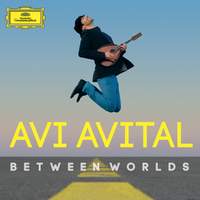Interview,
The Miraculous Mandolin
 It's probably fair to say that the mandolin doesn't come at the top of many people's lists of solo instruments. Yet this ancient instrument has been consistently popular across a wide range of genres from folk to classical, attracting interest from composers as diverse as Vivaldi, Beethoven and Webern.
It's probably fair to say that the mandolin doesn't come at the top of many people's lists of solo instruments. Yet this ancient instrument has been consistently popular across a wide range of genres from folk to classical, attracting interest from composers as diverse as Vivaldi, Beethoven and Webern.
Israeli mandolinist Avi Avital has done much to raise the instrument's profile, with a series of albums featuring works both written and arranged for the mandolin. Now, for his third release, he turns to Antonio Vivaldi - perhaps the foremost classical composer for the instrument. I caught up with Avi to talk about this plucky (sorry...) underdog among the string family.
How did you first come to realise that you wanted to make a career as surely the first star mandolinist for several centuries? Given that the roost is ruled mostly by singers, pianists and violinists, did you find the idea of a solo mandolin album difficult to ‘sell’ at first?
I don’t think I’ve ever spelled the desire to become a professional mandolin player throughout my childhood and adolescence. Even as an undergrad at the Jerusalem Academy for Music I was still questioning myself if this should really become my profession, maybe because I just didn’t know anyone who tested this water before. However, while I was wondering about it, I started to have more and more concerts and won some important competitions, until one day I realised I don’t have to think anymore whether I wish or not to become a professional musician, since I’ve already become one, so I better accept it and start to enjoy it.
I never looked at the mandolin as inferior to any other musical instruments and therefore in my head I couldn’t see any reason why it wouldn’t work. Quite the opposite, I’ve always enjoyed the fact that for most of the people, in each concert I have, it is the first time they ever hear a mandolin live. That’s the great privilege in being a mandolin player.
Your previous two albums, ‘Bach’ and ‘Between Worlds’ have consisted mostly of arrangements for the mandolin, rather than works written specifically for it. Do you find your approach is different when you’re playing works that are ‘native’ to your instrument rather than transcriptions?
Adapting repertoire to my instrument comes both from a necessity (not too many composers wrote music for the mandolin) and from my curious nature. There are pieces that I simply love and that believe I have “something to say about” and therefore I make them mine. Original repertoire has certain ease, especially technically. It doesn’t have the same challenges as in arranged music, whether from the technical or the intellectual points of view. There are a few masterpieces for the mandolin (like Vivaldi’s sole Mandolin Concerto in C major RV425) that are absolutely brilliant in the way they’re written and which is always a joy to return to.
Speaking of transcriptions, the slow movement of the RV443 Recorder Concerto is a particular joy – but were there any ‘dead ends’ of works that you thought about transcribing but found it just didn’t work? How did you decide which pieces to adapt for this album?
That’s an interesting observation because initially I had my biggest doubts with this very same Recorder Concerto RV443 you mention: I didn’t think it’ll work at all on the mandolin! The range of it is quite high for the mandolin; the fact that it’s a slow movement written for a wind instruments means that there were a lot of long notes played to be played in a smooth legato. In fact, this track was never supposed to be on the album. Prior to our recording sessions, the Venice Baroque Orchestra and myself had a short concert tour that served us also for “cooking” our interpretations before burning it for good on a record. This Largo was never part of the programme, but we always played it for the encore. A week later, when we were almost done with the recording and realised we have some spare time in the studio, members of the orchestra suggested, “why don’t we record that Largo?”. I believe that the pressure-less land of the encores allowed me to find my way through it by experimenting several nights it on stage. It was a great surprise to me and is now one of my favourite tracks on the album.
You’ve tested the waters with a version of Summer, which I for one find tantalising; might we expect a full Four Seasons to follow in the future?
Never say never! For a long time I wanted to make a “Vivaldi” album, including my favourite pieces which are indeed included on the album. The idea of recording the entire Four Seasons was on the table at some point of planning, but I felt it might pass as a gimmick rather than the real tribute I wanted to pay Vivaldi. In fact, I feel that the presence of Summer as a standalone is a strong statement and is a proof that this powerful music is independent of the other Seasons. That said – I’m performing the other Seasons in concerts, so, I guess, I might as well record them at some point.
Avi Avital's Vivaldi album was released on Monday on Deutsche Grammophon.
Available Formats: MP3, FLAC, Hi-Res FLAC
Other recordings by Avi Avital
The dizzyingly eclectic Between Worlds explores the mixed heritage of the mandolin, with one foot in classical music and the other in the traditional folk genres of Eastern Europe and West Asia.
Available Formats: CD, MP3, FLAC, Hi-Res FLAC
A collection of arrangements by Avital himself of some of the finest works of JS Bach for solo instrument and orchestra, showing the fascinating adaptability of both the instrument and the musician.
Available Formats: MP3, FLAC





